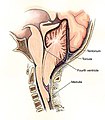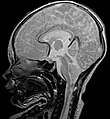Chiari malformation
Revision as of 09:12, 16 September 2015 by Jensflorian (talk | contribs) (histology in chiari (mostly type II))
Chiari malformation is a developmental abnormality of the brain.
General
- Usually a radiologic diagnosis.
- May be seen in a fetal autopsy.
Clinical:[1]
- Headaches, occipital.
- Dizziness.
- Nocturnal respiratory abnormalities.
Classification
Numbered from least severe to most severe:
- Chiari type I - tonsils herniated[2] (radiologic definition: 4-6 mm below the plane of the foramen magnum).
- Associated with: sudden death,[3] sleep apnea, cerebellar ataxia.
- Chiari type II - often assoc. with hydrocephaly at birth. Often associated with myelomeningocele.
- Chiari type III - cerebellum + brain stem herniate through foramen magnum +/- encephalocele.[4]
- Chiari type IV - cerebellar hypoplasia or no cerebellum.
Histology
Surgery depends on clinical symptoms due to CSF obstructions. Specimens may include: [5]
- Vertebral bone (decompression)
- Hermiated cerebellar tonsils.
- Reactive / dysplastic choroid plexus.
- Glial nodules.
- Arachnoidal cysts.
- Subependymomas.
In cases with myelomeningocele at autopsy, the posterior fossa should be examined.
Images
See also
References
- ↑ Ferré Masó, A.; Poca, MA.; de la Calzada, MD.; Solana, E.; Romero Tomás, O.; Sahuquillo, J. (Mar 2011). "Sleep disturbance: a forgotten syndrome in patients with Chiari I malformation.". Neurologia. doi:10.1016/j.nrl.2011.01.008. PMID 21420201.
- ↑ URL: http://rarediseases.info.nih.gov/GARD/Disease.aspx?diseaseID=9230. Accessed on: 6 May 2011.
- ↑ Zhang, J.; Shao, Y.; Qin, Z.; Liu, N.; Zou, D.; Huang, P.; Chen, Y. (Dec 2012). "Sudden Unexpected Death due to Chiari Type I Malformation in a Road Accident Case.". J Forensic Sci. doi:10.1111/1556-4029.12051. PMID 23278920.
- ↑ URL: http://www.ninds.nih.gov/disorders/chiari/detail_chiari.htm. Accessed on: 6 May 2011.
- ↑ Piatt, JH.; D'Agostino, A. (Feb 1999). "The Chiari II malformation: lesions discovered within the fourth ventricle.". Pediatr Neurosurg 30 (2): 79-85. doi:28767. PMID 10325563.



